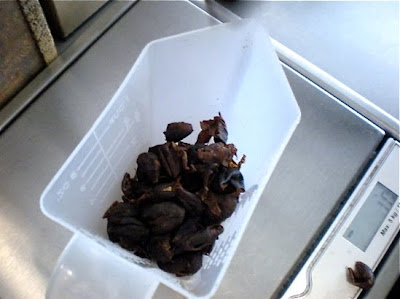But you can actually have them both, and be able to look at yourself in the mirror the next morning.

The secret is cascara, a tea made from steeping the dried skins of coffee cherries, which today are normally discarded during processing. This tea is actually an ancient drink known as qishr, and the original way coffee was prepared beginning around the 9th century in Abyssinia (modern-day Ethopia).
Do you understand what this means? Before extra-foam triple half-caf grande soyaccinos, coffee was tea. I'm not being all teaist, either. It's just a fact.

Cascara is simple to make, but a lack of available information or research invited experimentation. Playing around with the dose, water temperature and steeping time, I found 5 grams per 1 cup of just-boiling water, brewed for 8 minutes, to be ideal.

The few other guidelines I turned up recommend a 7-minute maximum brew, but as you can see (photo, below), this produced a much fainter- in color and flavor- cup of tea. It didn't seem that an additional minute would make much of a difference, but it brought out the deep, cherrylike sweetness in way that made the botanical connection suddenly hit on your tongue: Coffee comes from a fruit.

I'm not advocating it as a traditional tea substitute, but for any espresso addicts in search of a transition drink, this could get you off the junk. It's much closer to a fruit or berry tisane than a true (Camellia sinensis) tea, but it's a start.

Plus, it's made from what is usually considered trash. How eco is that?
If you still don't believe me, here's a little video of the whole process from the Square Mile Coffee Roasters, in London, which is where this batch is from.







11 comments:
I like coffee,
I like tea,
does that make me a catastrophe?
I love both! Where can I get some of these coffee/tea leaves/berry shells in the U.S., or can I? I'd love to try this - it's like the best of both worlds!
where is the nearest branch of dried skins of coffee cherries R US?
mine came from the square mile coffee roasters, or you can order them domestically from counter culture coffee ($9.95 for 4 ounces).
hope you enjoy your cup as much as i did.
Does it contain caffeine? More or less than a typical cup of tea?
Wow, this is really neat! I'd love to try this sometime.
It is eco and that's a good thing. But I'm afraid I'm a tea purist and must assert that this is still a tisane and not a real tea. Give me a true Camellia Sinensis tea, and make it Puerh.
I happen to prefer tea, but I drink coffee on occasion. It has to be a very good coffee, strong without bitterness and not the "European roast" that tastes unbearably bitter to me. I can't drink coffee without milk.
It seems that this coffee tea doesn't actually taste like coffee or tea, but has a taste of its own. It's something worth looking into.
I have to add that though I admire and respect Jason, I respectfully disagree with him about the word "tea". True tea is only from the Camellia sinensis, that's true, but the word "tea" became synonymous with the word "infusion" almost immediately after its entry into the English language.
There is a misconception about that the term "herbal tea" is new. It isn't. I have consumed both herbal and true teas all my life. In the term "herbal tea", the word tea is not referring to what the beverage is made from. It is referring to the method by which it is produced. From that aspect, it may actually be more accurate than the term "tisane" since a tisane is a decoction rather than an infusion. Just something to think about.
I think tea drinkers should feel free to choose whichever term they feel appropriate. I don't think it makes anyone less of a tea lover because of his or her word choice.
We all know a true tea from an herbal tea no matter what we call it.
I completely agree. Tea has to contain camelia sinensis. In the UK, some people call Rooibos tisane as "Red Tea" thus being grouped together as pu-erh. It is confusing enough for all given the wide arrays of tea names so let's not confuse it even more.
Great Post: Here is something useful for all.
I came across a site called Matcha Green Tea that I thought was pretty good.
Post a Comment